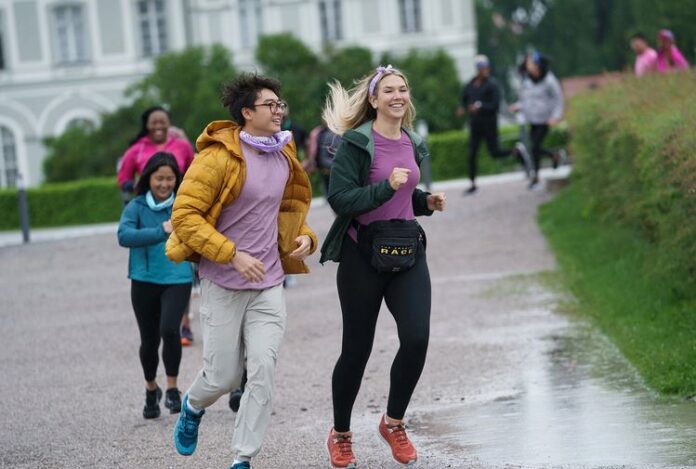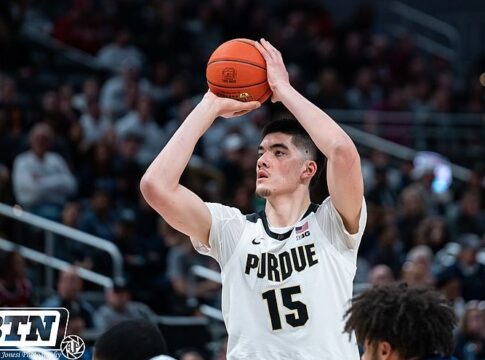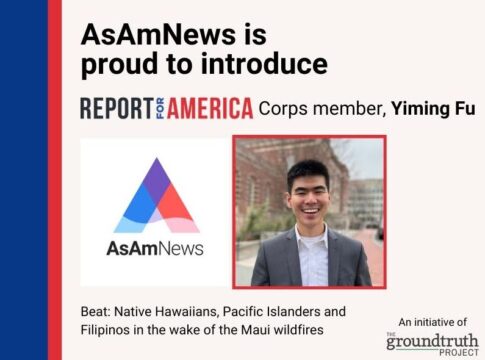By Julia Tong, AsAmNews Staff Writer
(Editor Note: Spoiler Alert: If you have not seen episode 1 of Season 34 of The Amazing Race which originally aired September 22, 2022)
A reality TV star, racing with the girlfriend he met while competing on the show, along with a pair of long-lost twins, separated from birth after their adoption from Korea: they are among the many Asian Americans competing in the 34th season of The Amazing Race.
The classic reality TV show features 12 pairs of contestants as they travel across the world, completing creative and memorable challenges. This year, the show will visit locations such as Jordan, France, Spain, and Nashville, following teams as they race for the million-dollar prize waiting at the finish line.
On top of that, The Amazing Race 34 is a “season of firsts”: the first to feature no non-elimination legs, a starting line outside the US, and a redesigned first leg called “the Scramble,” in which teams are given the locations for all three challenges at once to complete in any order.
LATEST STORIES
Against this historic backdrop, three Asian Americans are racing for more than the $1 million prize.
Former Big Brother house guest Derek Xiao has joined forces with girlfriend Claire Rehfuss, whom he met on that show. He is determined to bring his own approach to Asian representation on the screen. Meanwhile, for long-lost twins Emily Bushnell and Molly Sienert, the show is a crucial time to bond, as well as raise awareness for other adoptees like them.
In the first race of the leg, aired on September 21st, Xiao and Rehfuss rolled, hacked, and sawed their way to first place, winning a bonus prize of $2,500 each. Bushnell and Sienert followed soon after, finishing the course in 5th place.
But results aside, the race is a chance to bond, tell their stories, and, crucially, be representation for the community of AAPIs and Asian American adoptees that are rarely seen on reality TV.
“I wanted to create an example of what a normal guy is like without having to fall into any specific stereotypes.”
When Xiao was first selected to compete on Big Brother, he assumed it would be the worst summer of his life.
Xiao had never seen the reality competition show before applying to an Instagram casting call for fun. Hours later, he found himself in the semifinal round of the audition process. Soon, he was being required to binge the show in order to improve his chances of being selected.
When he finally watched Big Brother, though, Xiao hated the show: he found himself unable to connect with any of the contestants that he saw onscreen.
“When I watch reality TV, I’m like, ‘Yeah, these are really like outgoing personalities, but nothing that I really relate to,’” Xiao said. “And then if you narrow it down even more to specifically Asian Americans, I definitely never saw anyone that I related to.”
Xiao’s summer on Big Brother, however, was life changing for him. Despite being eliminated at Week 7, fans voted Xiao Runner Up for America’s Favorite House Guest. He began dating his current girlfriend and Amazing Race partner, Claire Rehfuss, while in Big Brother post-elimination jury house. And moreover, Xiao was tapped to participate in more CBS projects, such as The Challenge and Amazing Race 34.
Now, Xiao has swapped Big Brother endurance challenges for running with a travel backpack, rolling beer kegs down obstacle courses, and flying across the world.
He grew up watching scripted media, which often lacked Asian representation. He recalls that this stifled his own perception of who he could be.
“Growing up what did we have? Wendy Wu, Homecoming Warrior, Jackie Chan, animated series?” he said. “I literally did not see a single Asian American on TV that I felt like—not even inspired me, but reminded me of myself.”
Xiao hopes to remedy that by being his normal self in front of the camera. Being a voice for Asian Americans and simply representing them, he observes, are very different. However, he hopes to continue leading by example. The many positive messages he’s received from Asian American viewers continues to inspire him to do so.
“[The messages] I really love is kind of like watching me on TV has encouraged them to do something in their own life,” Xiao says. “And ultimately, that’s what I’ve wanted… not just to make a statement, but to help people take action in their own lives, if that is something that they needed or wanted to do.”
“So much more… than just a race for a million dollars”

Emily Bushnell had no idea she had a sister. Adopted from Korea shortly after birth, Bushnell had never connected with her birth family. However, when her daughter took a DNA test, 23andMe identified another woman as Bushnell’s mother, with a 49.96% DNA match.
The woman, Molly Sienert, reached out soon after, questioning how it was possible. But they soon noticed similarities between them: Not only were they both adopted from Korea in the 1980s, they looked especially alike. It wasn’t until they learned they were both 35 years old, and born on March 29th, that they realized they were twins.
“My heart started racing,” Sienert said. “It seems like true fate brought us together… We reentered each other’s lives at pivotal moments.”
In the year since they reconnected, Sienert and Bushnell stayed in touch. The twins learned about their similarities—both were raised by white Jewish families—and differences—Sienert was convinced that dancing was in their DNA, which Emily promptly disproved. However, their busy lives made it difficult to find time to bond.
The Amazing Race was, Sienert said, the “opportunity of a lifetime.”
“We’re 36 year old career women who don’t have a minute to breathe. If we could do [the race], we would get exclusive time together—no cell phones—and we get to travel.”
“It was everything we needed,” she added. “You can’t catch up on 36 years. That’s impossible. But [being] on the race, you sure as hell get a [shot] at it.”
Beyond much-needed sibling time together, however, the twins hope that their story will resonate with other Korean American adoptees like them.
Both Bushnell and Siebert stress that their adoptive families were loving and caring, and they felt connected to their Jewish cultural roots. Despite this, however, both of them struggled with feelings of grief and isolation that came with losing their cultural connection to their Korean heritage.
“We also represent the adoptee community and the trauma that could come out of adoption,” Bushnell said. “Hopefully others will somehow connect [with] us.”
Siebert recalls she often grew up lonely. At the time, she thought it was because she was an only child. However, she also had the sense that she was different—for instance, she was one of the few Asian students at her Jewish private school.
Today, Siebert has recognized that those feelings were a product of her adoptee experience. Adoption from Asian was still new in the 1980s, she observes, and few support systems were in place to help adoptees learn about their background. She wishes she had the opportunity to engage with her Asian heritage from an earlier age.
“If more adoptees could [have a cultural connection] earlier on, maybe there would be less disconnection and some depression that’s [common in] adoptees,” Siebert said. “There’s this stigma around expressing your feelings, because you’re supposed to be grateful for being adopted. But in reality, there’s a trauma.”
Bushnell, too, agrees that resources for adoptees would have been important for her. She hadn’t heard of any of them, such s culture camps or support groups of Korean American adoptees, until her late 20s.
One night, Bushnell recalled, she heard a NPR interview with a Korean adoptee of a similar age to her. The adoptee described walking into a room of other Korean adoptees and feeling, for the first time, at home—even more so than walking into her own family’s home.
Bushnell realized that she “longed” for that experience that those resources could have given her.
“How many other adoptees in the world, not just Korean, don’t know about these resources?” Bushnell said. “And I would just love to be able to take our experience, our story, because we’ve been so in the public eye… and pivot that into something that could be useful to others because there’s so many of us.”
Aside from adoptee awareness and bonding time, there’s a final factor propelling the twins. Sienert’s mother recently passed away from undiagnosed metastatic cancer. An avid world traveler, she had regularly watched The Amazing Race with Sienert. Bushnell and Sienert hope to honor her memory through racing on the show.
To Bushnell, the show’s timing was “another reason why we believe the universe kind of brought us together at this at this time and brought us on to the race together.”
“It’s so much more to us than just a race for a million dollars, but an opportunity for us to get back some time that we had lost.”
AsAmNews is published by the non-profit, Asian American Media Inc. Follow us on Facebook, X, Instagram, TikTok and YouTube. Please consider making a tax-deductible donation to support our efforts to produce diverse content about the AAPI communities. We are supported in part by funding provided by the State of California, administered by the California State Library in partnership with the California Department of Social Services and the California Commission on Asian and Pacific Islander American Affairs as part of the Stop the Hate program. To report a hate incident or hate crime and get support, go to CA vs Hate.








